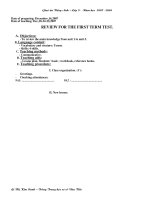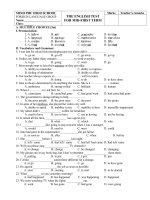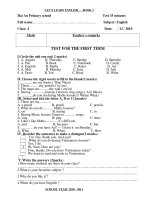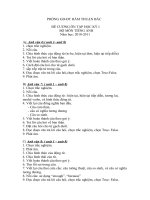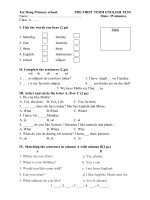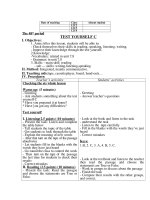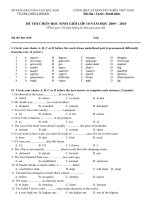PRACTICE TEST FOR THE FIRST TERM
Bạn đang xem bản rút gọn của tài liệu. Xem và tải ngay bản đầy đủ của tài liệu tại đây (123.01 KB, 6 trang )
<span class='text_page_counter'>(1)</span>Practice test for the first term READING. Read the passage carefully then choose the correct answers. Hatred is a fundamental human emotion that has deep roots in society and culture. Psychologists believe that group identity and cohesion depend to a large extent on having a common enemy. It seems that the existence of “ bad guys” is an important element in defining who we are within a larger realm. It could be said that human beings love to hate. The first sings appear early in life when a child, faced with blame for some mistakes, immediately accuses another child or an inaimate object such as a teddy bear. Later, on the schoolyard playgruond, children in rival groups vie for attention and influence. These basic responses translate into more powerful emotions later in life. One area where deep-rooted hatred is exhibited is in the ethnic clashes that constantly occur around the globe. These conflicts are not only over terriory but also involve emotional issues of group identity and unity of purpose. For many, there is no “us” without a “them” to hate. In a world where conflict between superpowers is on the decline, it may be that humanity will have difficulty adapting to a state of mutual respect and cooperation. 1. Which of the following is the best title for the passage? A. Roots of Society B. Group Unity C. A Basic Emotion D. Social and Cultural Problems 2. According to the passage, what is believed to be an important aspect of defining group identity? A. Facting a common enemy B. Being reluctant to hate C. Accepting blame for past actions. D. Igonoring a larger realm. 3. In line 7, the word “vie” could be best replaced by which of the following? A. cooperate B. compete C. manipulate D. defend 4. According to the passage, early childhood responses to blame ……. A. are not related to stronger feelings in adulthood. B. are complex expressions of emotion. C. demonstrate how human beings love to hate D. are not well understood by psychologist. 5. The author suggests that when children make mistakes, they …….. A. join rival gangs on schoolyard playground. B. rarely accept responsibility for their actions. C. need emotional support from personal objects like teddy bears. D. ready admit to their errors. Choose the word or phrase (A, B, C or D) that best fits the blank space in the following passage. Have you ever stopped (1) ……………. why people give each (2) …………….eggs at Easter? The Christian festival of Easter celebrates the return of Jesus Christ from the death, but the festival is actually named (3) ……………. The goddess of the sun, Eostre, whose name is taken from the East where she (4) ……………. . In very ancient times, Easter was a celebration that winter was (5) ……………. And that a new life was about to begin. The rabbit, (6) ……………. to the number of young it produces, is the symbol of life. In some parts of the world, the rabbit leaves large (7) ……………. of eggs ( another symbol of new life) in the garden and children have to find as many as they can. This is very (8) ……………. Christmas when Santa Claus leaves the presents for individual children. At Easter, children have to be independent and (9) ……………. after themselves. In this (10) ……………. the hunt for Easter eggs represents the need for young people to go out into the world and make their own fortune. 1. A. to wonder B. wondering C. wonder D. wander 2. A. else B. person C. others D. other 3. A. for B. about C. after D. with 4. A. goes B. sets C. rises D. raises 5. A. finish B. conclution C. up D. over 6. A. as B. since C. due D. because 7. A. numbers B. sums C. figures D. totals 8. A. like B. unlike C. different D. similar 9. A. take B. get C. look D. carry 10. A. day B. way C. habit D. time PHONETIC. Choose the word that has the underlined part pronounced differently from that of the others. 1. 2. 3. 4. 5. 6.. A. thing A. cure A. strives A. diving A. luxury A. says. B. thought B. tutor B. states B. discovery B.example B. plays. C. though C. sure C. stays C. discripline C. exist C. days. D. thumb D. pure D. studies D. divide D. exempt D. raise.
<span class='text_page_counter'>(2)</span> 7. A. pull B. during 8. A. than B. theater 9. A. imagined B. released 10. A. some B. come 11. A. garland B. garlic 12. A.owl B. cow VOCABULARY AND GRAMMAR. C. pure C. theory C. rained C. love C. garage C. arrow. D. cure D. thorough D. followed D. home D. garden D. powder. Choose the one word or phrase - a, b, c, or d - that best completes the sentences. 1. She’s ………………….. at making cheap but stylish clothes. A. expert B. good C. clever D. All are correct 2. They are all expert………………….. this field. A. in B. over C. at D. into 3. They made ………………….. to the bus service. A. progress B. improvement C. effort D. trial 4. The organization ………………….. food to the earthquake victims. A. supplied B. distributed C. delivered D. All are correct 5. He toook up the work ………………….. enthusiasm. A. in B. with C. about D. on 6. Because his argument was so confusing, ………………….. people understood it. A. many B. clever C. less D. few 7. ………………….. interested in that subject, I would try to learn it. A. Were I B. Should I C. I was D. If I am 8. If I ………….. the same problems you had as a child, I might not have succeeded in life as well as you have. A. have B. would have C. had had D. should have 9. I didn’t get home until well after midnight last night. Otherwise, I ………………….. your call. A. retuerned B. had returned C. would retuern D. would have returned 10. Even children who are ............. keen on a particular occupation often know little about it. A. deservedly B. reservedly C. supposedly D. hurriedly 11. Peter always completes his work ....... . A. with great pleasure B. by great pleasure C. with greatly pleasure D. with great pleasantly 12. You have made ............. mistakes in your writing. A. so much B. a lot of C. little of D. much of 13. Don’t drink ............. wine. It’s bad for your health. A. many of B. a few of C. so much D. many 14. What would John do if he ............ the director of this company? A. is B. was C. were D. has been 15. She had worked ........ she made herself ill. A. such hard that B. such hardly that C. so hardly that D. so hard that 16. He had spent ............. writing an essay about his childhood. A. a large number of time B. a great deal of time C. a few time D. many time 17. "Would you like some more cake?" "Yes, please, but only ............." A. a little B. little C. few D. a few 18. A great deal of machinery ............ sent to the exhibition recently. A. are B. is C. has been D. all incorrect 19. A lot of furniture in her room ............. new. A. is B. are C. was D. were 20. We didn't have any money but Tom had ................. A. a little B. little C. a few D. few 21. We didn't take ................ photographs when we were on holiday. A. many B. much C. an amount of D. a great deal of 22. We had no ............... in finding a job. A. difficulty B. difficult C. difficulties D. all correct 23. You can get ................treatment in this hospital. A. occupy B. occupied C. occupation D. occupational 24. “He made a decision to leave home.” means A. He decided to leave home B. He decides to leave. C. He made decisive to leave home. D. He made decide to leave home. 25. Nora's father died ............... years ago. A. few B. a few C. much D. a large amount of 26. Products in this shop were............... arranged, displayed, and presented on the shelves. A. attracted B. attractive C. attraction D. attractively 27. She finds it ................to stop smoking. A. difficult B. difficulty C. difficultly D. difficulties.
<span class='text_page_counter'>(3)</span> 28. She is a very quiet person. She doesn't say ................. A. many B. much C. few D. little 29. She is an ................mother in a few more weeks. A. expectant B. expectation C. expectantly D. expecting 30. Have I ................ to you how to use this new typewriter? A. answered B. explained C. told D. showed 31. We often watch a film on T.V................ going to bed. A. then B. during C. upon D. before 32. He thinks you are ................ your time looking for a job in this town. There’s not much to do here. A. wasting B. spending C. missing D. losing 33. You will be surprised at how................ Joe is in French after a year. A. fluently B. fluent C. fluency D. influence 34. Although he was quite fat, Tom was not very pleased about ........... called Piggy by his classmates. A. be B. being C. was D. having 35. Carl and Malcolm look like brothers but actually they are not .......... . A. relative B. relation C. related D. family 36. The woman said the murderer was a short, ........... man with a beard. A. petite B. tallish C. stocky D. average 37. Some people ......... sport to keep fit, not because they like it. A. do B. make C. train D. practice 38. One ....... of the scheme is the very high cost. A. advantage B. shortage C. drawback D. shortcoming 39. I really can’t ............ the twins apart. They look so alike. A. say B. talk C. take D. tell 40. We ............... Catherine yesterday when we were shopping. A. came across B. bumped into C. ran to D. fell into 41. I don’t think she can get her message .............. to the students. She seems too nervous. A. across B. around C. out D. over 42. His speech ..... little or no relation to the topic given. A. gave B. reflected C. bore D. was 43. What’s wrong with you today? Did you get out of bed on the wrong ................... ? A. end B. side C. foot D. edge 44. When I told the doctor that I had had earache for nearly a month, he gave me a .......... for ear – drops. A. ticket B. recipe C. receipt D. prescription 45. I wish you ......... to leave now. The party has just begun. A. don’t have B. not have C. wouldn’t have D. didn’t have 46. Jack ............ be so bad-tempered; I wonder if he’s got problems. A. isn’t use to B. didn’t used to C. wouldn’t D. didn’t use to 47. Even with vast research, there is still a great deal that is ............. known about the workings of the human brain. A. neither B. none C. no D. not 48. The United States consists of fifty states, ........ has its own government. A. each of which B. they each C. each of them D. each of 49. If it hadn’t been for you laziness, you ......... the exams. A. could pass B. had passed C. could have passed D. must have passed 50. Everyone hopes to succeed in life, ................. ? A. doesn’t he B. hasn’t he C. haven’t they D. don’t they 51. As a protection device, an octopus ejects black or purple ink to cloud the water when ........ . A. does it escape B. its escape C. it escapes D. escapes it 52. Wherever there is plenty of rain during the growing season, life is ............ in various forms. A. abundant B. the abundance C. an abundant D. it abundant 53. Despite its wide range of styles and instrumentation, country music has certain common features ......... its own special character. A. give it that B. that give it C. give that D. that gives it to 54. .......... discussed by the board of directors when it was proposed again by the supervisors. A. The problem had already B. The problem is already C. The problem had already been D. The problem has already 55. .............. provided a living for nearly 90 percent of the population of the American colonies. A. Farming was what B. What farming C. Farming was D. What was farming 56. But for their help, he ................ . A. would have failed B. has failed C. has not failed D. wouldn’t have failed 57. I can’t go with you today; I have ........ things to do. A. a great deal B. a great many C. many a great D. great many 58. I applied for the position of a receptionist, but they had ...... for computer programmers. A. empty B. vacancies C. blank D. left.
<span class='text_page_counter'>(4)</span> 59. She is rather intelligent. After learning English for two months, she mastered the .......... English grammar. A. basic B. foundation C. platform D. step 60. In simple animals, ......... reflex movement or involuntary response to stimuli. A. behaviour mostly B. most is behaviour C. most behaviour is D. the most behaviour 61. I can’t go with you today; I have ........ things to do. A. a great deal B. a great many C. many a great D. great many 62. I applied for the position of a receptionist, but they had ...... for computer programmers. A. empty B. vacancies C. blank D. left Identify the one underlined word or phrase -A, B, C or D- that must be changed for the sentence to be correct.. 1. Why did all the customers at the Red Lion have to pay of their beer that weeks? 2. The heavy rain made it possible for us to have our picnic 3. If you make a five-days trip across the Atlantic Ocean, your trip enters a different time zone everyday 4. When he arrived at the furniture shop, the had been sold the table he wanted 5. May Day regularly is celebrated in many countries around the world 6. If airplane tickets wasn’t expensive, I could fly to Singapore for my holidays 7. Friends advised her to stop doing the housework because her old age 8. Although she is 103 but she still does a lot of work in the flat 9. He had so a difficult exercise that he couldn’t do it 10. It is the larger city in Europe with a population of cover eight million 11. It is a beautiful building of two towers and a very big clock called Big Ben 12. Many hundred years ago there were many villages and little towns in England 13. They usually took a tree back with them and but it on the centre of the village 14. The international working class made the one of May their day of solidarity 15. The first May Day celebrated in England in 1890 16. Television is one of man’s important mean of communication 17. Though TV, home viewers can see and learn about people , places and things in faraway lands 18. TV provides many more entertainment program as any other kind 19. Poverty desert countries in Africa can grow guayule 20. The rubber farms will make a lot of money and give jobs to a great deal of people 21. Around the age of sixteen you must make one of the biggest decision of your life 22. Junko Taipei , is A Japanese from Hokkaido, was the first woman to make this difficult climb 23. A Tokyo newspaper – television company had organized the climb in 1975 24. Bill and Fred was students at a university and they were friends Choose the answer -a, b, c, or d- that is nearest in meaning to the sentence printed before..
<span class='text_page_counter'>(5)</span> 1. The plane had scarcely taken off when it crashed. a. The plane took off and soon afterwards it crashed. b. The plane hardly crashed after it took off. c. When the plane was taking off, it crashed. d. When the plane crashed, it hadn't taken off yet 2. Never has any one spoken to me like that! a. I never speak that way. b. Some people always speak to me that way. c. Everyone speaks to me that way. d. No one speaks to me that way. 3. It's a long time since I saw a movie. a. I spent a long time looking for a movie to see. b. I have seen some movies so far. c. I haven't seen movie for a long time. d. I saw a movie that took very long time. 4. He now goes to work on his bicycle instead of by car. a. He still goes to work by car but more often on his bicycle. b. He has stopped driving to work and goes by bicycle. c. He has never gone to work in his car but always on his bicycle. d. Since he bought the car, he has never used the bicycle to go to work. 5. I find myself at a loss to understand Harold's behavior. a. I lost contact with Harold, so I couldn't understand him well. b. I have to lose a lot to understand Harold's behavior. c. I completely understand Harold's behavior. d. I find Harold's behavior quite incomprehensible 6. We regret we cannot accept payment by credit card for sales of under $10. a. If you spend more than $10, you must pay by credit card. b. We make a charge if you pay by credit card. c. We prefer cash payment for large sales. d. If you spend less than $10, you cannot pay by credit card. 7. There's no point in persuading him to do this. a. He is able to do this although he does not want to. b. It would be useful to persuade him to do this. c. I enjoy persuading him to do this. d. It is useless to persuade him to do this. 8. Those students should be punished for what they have done. a. Those students should have done what they were punished for. b. What those students have done will give them some punishment. c. Those students can't get away with what they have done. d. The things those students have done are kinds of punishment. 9. Not many people attended the meeting. a. People didn't show up for the meeting. b. There was a poor turn-out for the meeting. c. Too many people turned out at the meeting. d. Hardly did people come to the meeting. 10. That young man is bound to fail in this test. a. There is no way that young man can succeed in this test. b. Certainly, that young man will pass this test. c. It would be impossible for that young man to fail this test. d. That young man almost failed in this test. 11. With the help of new computer programs, we can solve many problems quickly and accurately. a. New computer programs have enabled us to solve many problems quickly and accurately. b. New computer programs are quick and accurate. c. We can solve problems quickly and accurately without computer programs. d. New computer programs are not able to solve many problems quickly and accurately. 12. People swimming here do so at their own risk. a. People may swim here without fear or risk. b. Swimming is so risky here that it is forbidden. c. People should realize that it is dangerous to swim here. d. Swimmers will not be blamed if anything happens to them here. 13. After fighting the fire for 12 hours, the firemen succeeded in putting it out. a. The fireman managed in vain to put the fire out after a 12-hour fight. b. Having fought the fire for 12 hours, the firemen were able to put it out. c. The firemen wasted 12 hours putting the fire out. d. Fighting the fire for 12 hours, the fire was put out. 14. People donated a lot, so the victims of the tsunami are now able to overcome difficulties..
<span class='text_page_counter'>(6)</span> a. But for people's generous donation, the victims of the tsunami wouldn't be able to overcome difficulties now. b. Despite people's generous donation, the victims of the tsunami are facing lots of difficulties now. c. To overcome difficulties, the victims of the tsunami needed people's generous donation. d. The victims of the tsunami are now able to overcome difficulties but for people's generous donation. 15. 'If I were you, I would take the job,' said my roommate. a. My roommate was thinking about taking the job. b. My roommate advised me to take the job. c. My roommate introduced the idea of taking the job to me. d. My roommate insisted on taking the job for me. 16. He last had his eyes tested ten months ago. a. He had tested his eyes ten months before. b. He had not tested his eyes for ten months then. c. He hasn't had his eyes tested for ten months. d. He didn't have any test on his eyes in ten months. 17. He is not flexible in his work; that is why he doesn't have many friends. a. Having almost no friends makes him inflexible in his work. b. Such is his inflexibility in his work that he doesn't have many friends. c. Inflexibility in his work is not why he doesn't have many friends. d. He is not popular with many people although he is flexible in his work. 18. If I'd known about Josie's illness, I wouldn't have missed seeing her. a. I saw Josie, and I knew she was ill. b. I didn't know Josie was ill, so T saw her. c. I didn't know Josie was ill, and I didn't see her. d. I didn't see Josie although I knew she was 'ill. 19. Hardly are appeals allowed against the council's decisions. a. The council rarely allows appeals against its decisions b. It's too hard for the council to allow appeals against its decisions. c. The council always allows appeals against its decisions. d. Allowing appeals against its decisions is not good. 20. We are planning on spending the weekend in the country as long as the weather stays fine. a. We're planning on spending the weekend in the country despite the bad weather. b. If the weather is fine, we will spend the weekend in the country. c. If the weather is finer, we would spend the weekend in the country. d. If the country is nice, we will spend the weekend there. 21. Were it not for the money, this job wouldn't be worth while. a. This job is not rewarding at all. b. The only thing that makes this job worthwhile is the money. c. Although the salary is poor, the job is worthwhile. d. This job offers a poor salary. 22. She said she would go to the police unless she was given her money back. a. She went to the police because she hadn't got her money back. b. She hasn't yet got her money back or gone to the police. c. She wasn't given her money back because she had gone to the police. d. She was given her money back and then went to the police. 23. No one else must know this. a. You are not advised to know this. b. Everyone else must be silent. c. This must be kept secret. d. You should let every one else know this. 24. ' Would you like some coffee? Peter asked me. a. Peter offered to give me some coffee. b. peter asked me if I liked coffee. c. Peter asked me to make him a cup of coffee. d. Peter suggested having coffee. 25. We could have seen the movie if the tickets had not been so expensive. a. We wanted to see the movie, but the tickets were sold out. b. We couldn't afford the tickets to see the movie. c. We saw the movie even though the tickets were expensive. d. The tickets were inexpensive, so we saw the movie..
<span class='text_page_counter'>(7)</span>
